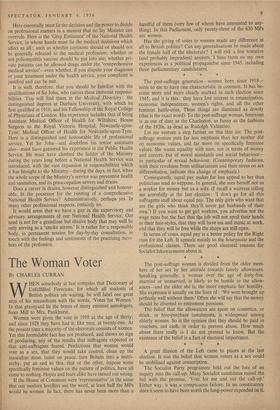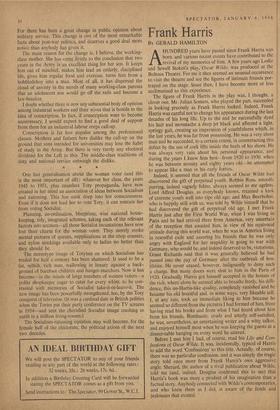The Woman Voter
BY CHARLES CURRAN wHEN somebody at last compiles that Dictionary of Unfulfilled Forecasts, for which all students of British politics are waiting, he will label one great area of his mausoleum with the words, 'Votes for Women.' In that graveyard lie the bones of many eminent astrologers, from Mill to Mrs. Pankhurst.
Women were given the vote in 1918 at the age of thirty; and since 1928 they have had it, like men, at twenty-one. At the present time a majority of the electorate consists of women. Yet this formidable fact has not produced, and shows no sign of producing, any of the results that suffragists expected or that anti-suffragists feared. Predictions that women would vote as a sex, that they would take control, clean up the masculine mess, insist on peace, turn Britain into a matri- archy, put an end to this,. that or the other, impose some specifically feminine values on the pattern of politics, have all come to nothing. Hopes and fears alike have turned out wrong.
If the House of Commons were 'representative' in the sense that our modern levellers use the word, at least half the MPs would be women. In fact, there has never been more than a handful of them (very few of whom have amounted to any- thing). In this Parliament, only twenty-three of the 630 MPs are women.
Has the giving of votes to women made any difference at all to British politics? Can any generalisations be made about the female half of the electorate? I will risk a few tentative (and probably imprudent) answers. 1 base them on my own experiences as a political propagandist since 1945, including three parliamentary candidatures.
*
The post-suffrage generation--women born since 1918— seem to me to have one characteristic in common. It has be- come more and more clearly marked in each election since 1945; and it is this : they have lost interest in emancipation. economic independence, women's rights, and all the other feminist battle-cries. These things are dismissed as dowdy (that is the exact word). To the post-suffrage woman, feminism is as out of date as the Charleston, as funny as the fashions of the 1920s, as dead as Rudolph Valentino.
Let me venture a step farther on this thin ice. The post- suffrage woman puts far less emphasis than her mother did on economic values, and far more on specifically feminine values. She wants equality with men, not in terms of money and careers, but of moral standards and social behaviour— in particular of sexual behaviour. (Contemporary fashions, with their revulsion from utilitarianism and their stress on sex differentiation, indicate this change of emphasis.) Consequently, equal pay makes far less appeal to her than politicians tend to suppose. In general, she sees herself not as a worker for money but as a wife. (I recall a waitress telling me scornfully at the last election : 'I don't go for all this suffragette stuff about equal pay. The only girls who want that are the girls who think they'll never get husbands of their own.') If you want to get girl workers, you advertise not the wage rates but the fact that the job will not spoil their hands or their hair-styles, that they will have tea and music at work, and that they will be free while the shops are still open.
-In terms of votes, equal pay is a better policy for the Right than for the Left. It appeals mainly to the bourgeoise and the professional classes. There are good electoral reasons for Socialist lukewarmness about it.
* * *
The post-suffrage woman is divided from the older mem- bers of her sex by her attitude towards family allowances. Speaking generally. a woman over the age of forty-five, married or unmarried, is likely to be hostile to the allow- ances—and the older she is, the more emphatic her' hostility. She expresses it usually on the lines of : 'We were brought up perfectly well without them.' Often she will say that the money should be diverted to retirement pensions.
The belief that the allowances are spent on cosmetics, or drink, or hire-purchase instalments, is widespread among elderly women. So is the opinion that they should be paid in vouchers, not cash, in order to prevent abuse. How much abuse there really is I do not pretend to know. But the existence of the belief is a fact of electoral importance.
* * *
A great illusion of the Left came to pieces at the last election. It was the belief that women voters as a sex could be mobilised against conscription.
The Socialist Party programme held out the lure of an inquiry into the call-up. Many Socialist candidates raised the bid with the promise, 'Vote for me and cut the call-up.' Either way, it was a conspicuous failure. In no constituency does it seem to have been worth the lung-power expended on it. For there has been a great change in public opinion about military service. This change is One of the most remarkable facts about post-war politics, and deserves a good deal more notice than anybody has given it.
The main reason for the change is. I believe, the working- class mother. She has come firmly to the conclusion that two years in the Army is an excellent thing for her son. It keeps him out of mischief, makes him lead an orderly, disciplined life, gives him regular food and exercise. turns him from a hobbledehoy into a man. Most of . all, it has dispersed the cloud of anxiety in the minds of many working-class parents that an adolescent son would go off the rails and become a law-breaker.
I doubt whether there is now any substantial body of opinion among industrial workers and their wives that is hostile to the idea of conscription. In fact, if conscription were to become unnecessary, I would expect to find a good deal of support from them for an industrial labour corps call-up.
Conscription is far less popular among the professional classes. Mothers and fathers here dislike the call-up on the ground that sons intended for universities may lose the habit of study in the Army. But there is very rarely any electoral dividend for the Left in this. The middle-class traditions of duty and national service outweigh the dislike.
One last generalisation about the woman voter (and this is the most important of all): whatever, her class, the years 1945 to 1951, plus ceaseless Tory propaganda, have now created in her mind an association of ideas between Socialism and rationing. This has sunk deep into her consciousness. Even if it does not lead her to vote Tory, it can restrain her from voting Socialist.
Planning, co-ordination, blueprints, wise national house- keeping, tidy, integrated schemes, taking each of the relevant factors into account—all those Socialist incantations have now lost their charm for the woman voter. They merely evoke mental pictures of queues, supplications at the shop counter, and nylon stockings available only to ladies no better than they should be.
The stereotype image of Toryism on which Socialism has traded for half a century has been shattered. It used to be a fat, selfish, rich man, wallowing in luxury against a back- ground of barefoot children and hunger-marchers. Now it has become—in the minds of large numbers of women voters—a polite shopkeeper eager to cater for every whim, to be con- trasted with memories of Socialist take-it-or-leave-it. The new image has been powerfully strengthened, too, by the Tory conquest of television. (It was a cardinal date in British politics when the Tories put their party conference on the TV screens in 1954—and sent the cherished Socialist image crashjng to earth in a million living-rooms.) The Socialism-rationing equation may well become, for the female half of the electorate, the political axiom of the next two decades.



































 Previous page
Previous page